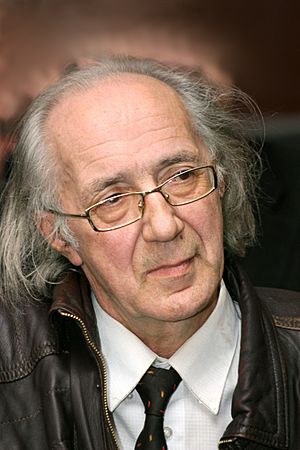Vadim Kuzmin facts for kids
Quick facts for kids
Vadim Alexeevich Kuzmin
|
|
|---|---|
| Вадим Алексеевич Кузьмин | |
 |
|
| Born | 16 April 1937 |
| Died | 17 September 2015 (aged 78) Moscow
|
| Alma mater | Moscow State University |
| Known for | coauthor of GZK limit |
| Scientific career | |
| Institutions | Institute for Nuclear Research |
Vadim Alexeevich Kuzmin (Russian: Вади́м Алексе́евич Кузьми́н) was a smart Russian scientist. He was born on April 16, 1937, in Moscow. He passed away on September 17, 2015, also in Moscow.
Vadim Kuzmin was a theoretical physicist. This means he used math and logic to create ideas and rules about how the universe works. He helped explain things we see in experiments.
What a Theoretical Physicist Does
A theoretical physicist uses deep thinking and math to understand nature. They don't usually do experiments themselves. Instead, they come up with theories. These theories help explain why things happen in the world. They also predict new things that scientists can then test.
For example, they might use math to describe how tiny particles behave. Or they could explain how huge galaxies move. Their work is like creating a rulebook for the universe.
Vadim Kuzmin's Important Work
Vadim Kuzmin was known for his work in a field called electroweak baryogenesis. This area of physics tries to explain how matter was created in the early universe. It looks at why there is more matter than antimatter.
He also helped develop something called the Greisen-Zatsepin-Kuzmin limit, often called the GZK limit. This idea is about very high-energy particles from space. These particles are called cosmic rays. The GZK limit explains that these super-energetic particles lose energy. They lose it as they travel long distances through space. This happens when they bump into tiny particles of light. This limit helps scientists understand how far these cosmic rays can travel. It also helps them learn where they might come from.
Vadim Kuzmin worked at the Institute for Nuclear Research. He also studied at Moscow State University. His ideas helped us understand more about the universe.
Images for kids
 | John T. Biggers |
 | Thomas Blackshear |
 | Mark Bradford |
 | Beverly Buchanan |


